Football Australia boss James Johnson on Matildas future, funding and focusing on women’s sport
Football Australia boss James Johnson lifts the lid on the plan to turn the Matildas into Australia’s favourite team, revealing how the sport plans to capitalise on the fervour generated by the World Cup.
Women's Football
Don't miss out on the headlines from Women's Football. Followed categories will be added to My News.
The Matildas are coming back to Australia’s east coast next year.
Amid concerns that the nation’s football heroes would disappear for two years given there are no scheduled matches outside of Perth until 2025, Football Australia boss James Johnson has confirmed the Tillies will play at least one match in Sydney, Melbourne or Brisbane next year before the Olympics in Paris.
“We could only ever play in three cities — that was Brisbane, Sydney and Melbourne — at this World Cup, so we’ve seen a lot of the Matildas,” Johnson told this masthead.
“We want to make sure the west got a taste of the Matildas as well, they’ll get that taste in October.
“But we’ll certainly be bringing the Matildas back home in the lead-up to the Olympic Games, it’s just a matter of scheduling matches against the right opponents in the right windows.
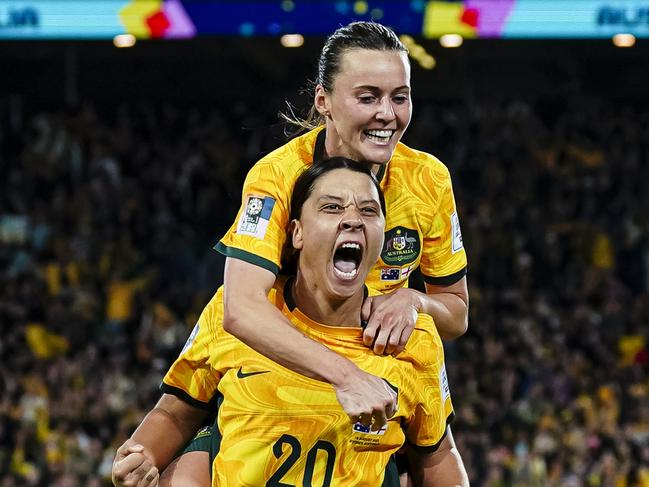
“That will happen in the lead-up to the Olympics, we just haven’t scheduled the matches in there. The Matildas will be back.
“I can’t talk specifics, we just haven’t got there yet. We’re scheduled for Perth in October, we’re talking about where the team will be in November.
“As we get into 2024, we’ve got a bit of work to do as to where we’ll play and who we’ll play against, those conversations will start after the women’s World Cup.
“But we’re committed to bringing the team back.”
In a wide-ranging interview ahead of Saturday’s bronze-medal match between the Matildas and Sweden in Brisbane, Johnson declared the women’s side as the premier sports team in Australia, discussed how Government money would be spent if they receive the funding they’ve requested, and revealed the moment he knew he had to commit to the women’s game in the face of fierce criticism three years ago.
MATILDAS ARE NO.1
A report compiled by the Gemba Group last month showed the Matildas were the second most popular sports team in Australia, behind the men’s cricket team.
But Johnson said the staggering response to the Tillies during this FIFA Women’s World Cup proves they are now on top.
“Right now when you look at that average audience the other night of 7.1 million people watching Australia play England, a total reach of 11 million — these are just Channel 7 numbers – these are not Optus numbers, and this doesn’t calculate the number of people watching at public viewing areas and bars,” Johnson said.
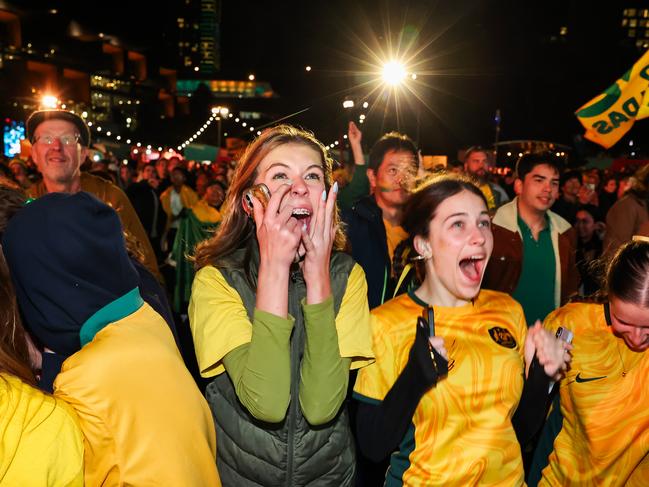
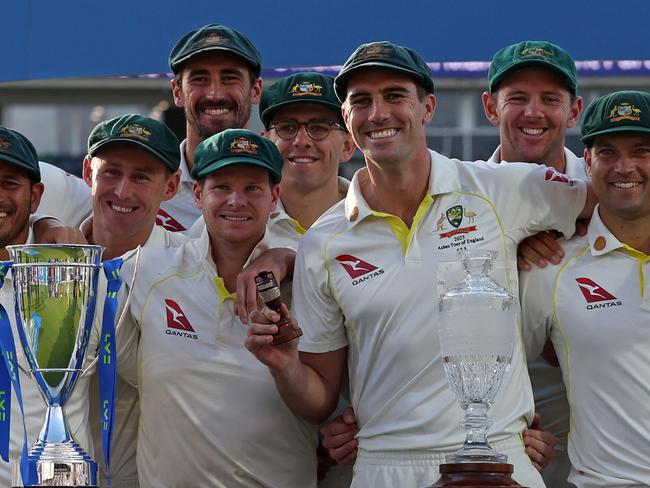
“Australian sport has never had a night like Wednesday night, never had a night like that.
“And the Matildas have driven that. Right now, they are the most valuable sporting brand in the country, and that’s just based on the numbers we saw.
“We’ve never seen anything like this.”
GOVERNMENT FUNDING
All sports are constantly begging the government for money, and there is only so much to go around when priorities must be cost of living, health, education and transport.
The government put in $84 million into women’s football – $44 million to host the World Cup and $40 million for grassroots programs – but that expires at the end of 2023.
Matildas star Sam Kerr has been the most vocal agitator for further government assistance, and Johnson outlined why it’s crucial for football to receive millions more.
“We’re in constructive dialogue with our Federal Government, they’ve been very supportive of both the Women’s World Cup and the Matildas,” Johnson said.
“We were given some exceptional funding to invest in the high performance program of the Matildas — that comes to an end at the end of this year. But what we’ve seen is the results of that additional funding for the Matildas, we’ve been able to put together a world-class program.
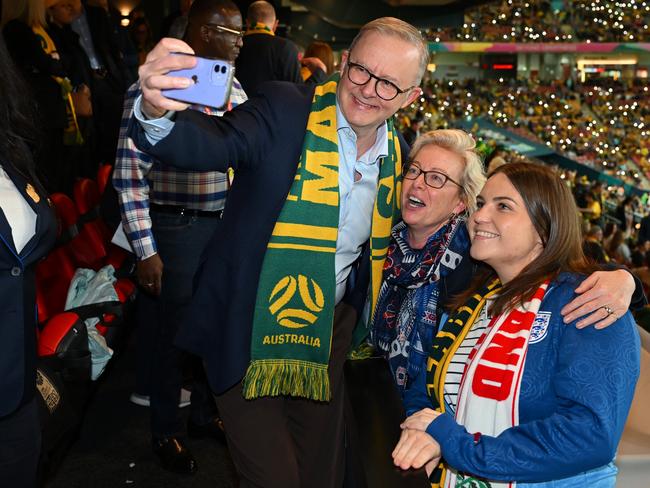
“What do we need to continue along this track? We need to maintain and continue that high-performance funding, that’s really important.
“We also need to look at our production line, and our next generation will be developed in the A-League’s women’s competition, we’d like to see some investment in this part of the game, that’s where tomorrow’s Matildas are being made.
“And the major area, and our priority, is our community funding. The reason that’s the top priority for us is that we have a legitimate challenge, which is we don’t have enough fields for the number of players we have in this country.
“It’s been a historical problem, but because of the success of the Socceroos at the World Cup in Qatar, where we saw a 10 per cent increase in participation, and because of the success of the Matildas at the Women’s World Cup, we’re expecting an additional 20 per cent increase.
“So this problem is going to become a lot bigger post Women’s World Cup, and we need support to solve that challenge.”
REBRAND AND RESISTANCE
When Johnson took over as FA’s chief executive in 2019, he announced that he was overhauling the game’s approach and making both the Matildas and Socceroos the faces of the game, rather than just the men’s team.
He was met with scepticism and disparagement. While updated Futures Sport & Entertainment data released this week shows the Matildas’ awareness and popularity at an all-time high – 54 per cent of all sports fans are now interested in the team – many couldn’t visualise such a result back then.
“Early on we were heavily criticised, I was personally criticised for spending too much time focusing on women’s football and the Matildas in particular,” Johnson said.
“There was a lot of criticism in 2020 and 2021. But as a leader, whenever you want to drive change and do something different, you do have people that resist and criticise.
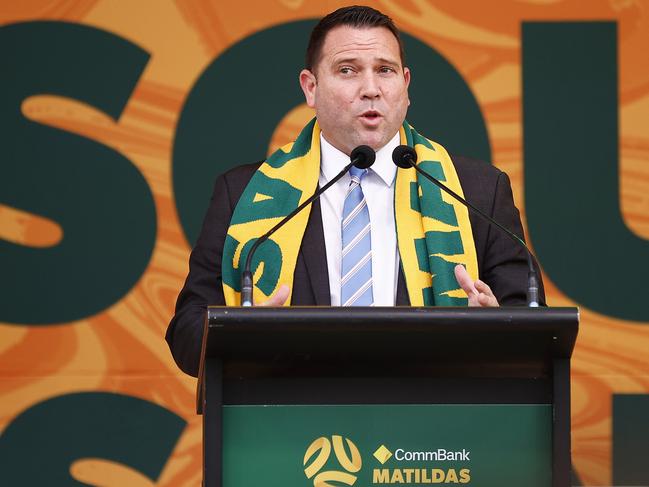
“That’s OK, it’s good to have those debates. The way I see it, once you implement a strategy, you’ve got to be committed to it.
“It was a matter of making sure me and my team went forward with focus on our vision to build this brand. And here today, it looks like it makes sense, but that wasn’t the case three years ago.
“Once you choose a strategy you’ve got to have the conviction to bring it to life, you will get pushback but I’m not one to a U-turn once we decide where we’re going, it’s about backing your people, giving everyone confidence, particular at the times others are question it, that’s the time to be strong and keep people united.”
THE MOMENT
It would have been easy for Johnson to crumble under the pressure and revert to the traditional approach of making the national men’s team the focus of the code.
But as he explains, an unexpected early morning encounter encouraged him to stay on course: “It was 4am, I was up watching the Socceroos play a qualifier in the Middle East in probably late 2021, and my seven-year-old son Quinn walks down the stairs, looks at the TV and says, ‘Daddy, whose playing?’
“I said, ‘You know whose playing’. And he said, ‘Oh yeah, it’s the boy Matildas’.
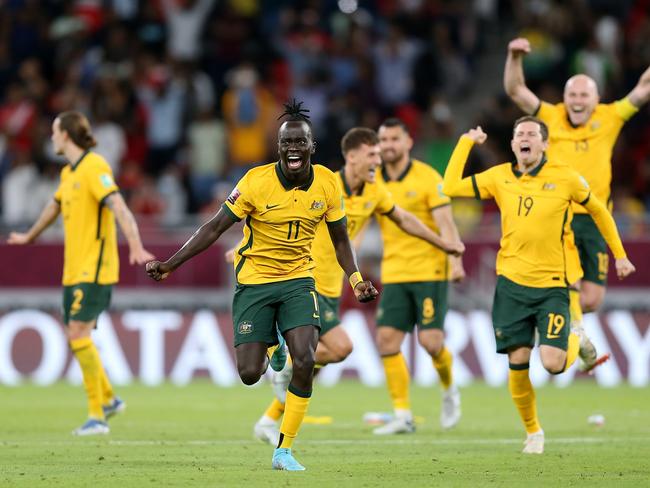
“To me, that shows how the next generation are looking at our national teams. I love the fact that children today, girls and boys, are looking up to the Matildas, that is special and makes me very proud.”
STORYTELLING
To ensure people felt a connection to the Matildas, FA deployed a unique strategy.
“We structured our vision around firstly, bringing the Women’s World Cup to Australia and secondly, using it to change the face of the sport,” Johnson said.
“We wanted to build the Matildas brand off the pitch. The growth can be linked to hosting the World Cup, but we needed to put front and centre of our sport two strong national team brands strongly linked to the community.
“The logic behind that was that it puts us in a competitive place against other sports, having a men’s and women’s national team front and centre of the sport.
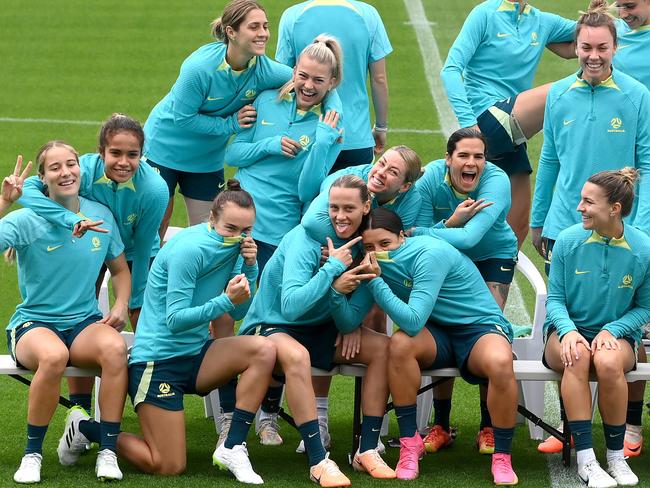
“Specifically with the Matildas, we had to bring in top sponsors, CommBank who talk to modern day Australia every day, Nike who are great storytellers, we did a deal with Disney+ who are the world’s best storytellers and told the story of the Matildas brand and the individuals.
“There’s been a lot of storytelling over the past three years, and what’s happened is the brand has continually increased in the lead-up to the Women’s World Cup. The players on the pitch have of course played a huge role in building the rand because when the performances are going the right way, brand movement happens.
“It all came to a crescendo at the Women’s World Cup where the brand has been elevated to another level, here we are today, with two of the strongest sporting brands in the country.
“I knew we would deliver the best Women’s World Cup, that was for sure.
“When we set the KPIs with New Zealand Football and FIFA, our KPIs were 1.5 million ticket sales and 2 billion TV audience across the world. I was confident we were going to hit those numbers.
“Of course we’ve smashed ticket sales, we’ll end up with about 1.8 million, and in Australia alone we’ve seen broadcast numbers that Australian TV programs have not seen before.
“I’m a little bit surprised by how big the domestic broadcast numbers were, but the reason that occurred is that the Matildas were running parallel. As they got through the group stage with a dramatic loss to Nigeria and then beating Canada 4-0 that started to increase.


“As they got into the round of 16, then the drama of the French match and the penalties saw another dramatic increase.
“Having half the country tune in to watch Australia play the Lionesses is just something we’re all still stunned by, but that’s what happens when you’ve got a top national team performing very well in the world’s biggest sporting competition.”
More Coverage
Originally published as Football Australia boss James Johnson on Matildas future, funding and focusing on women’s sport





